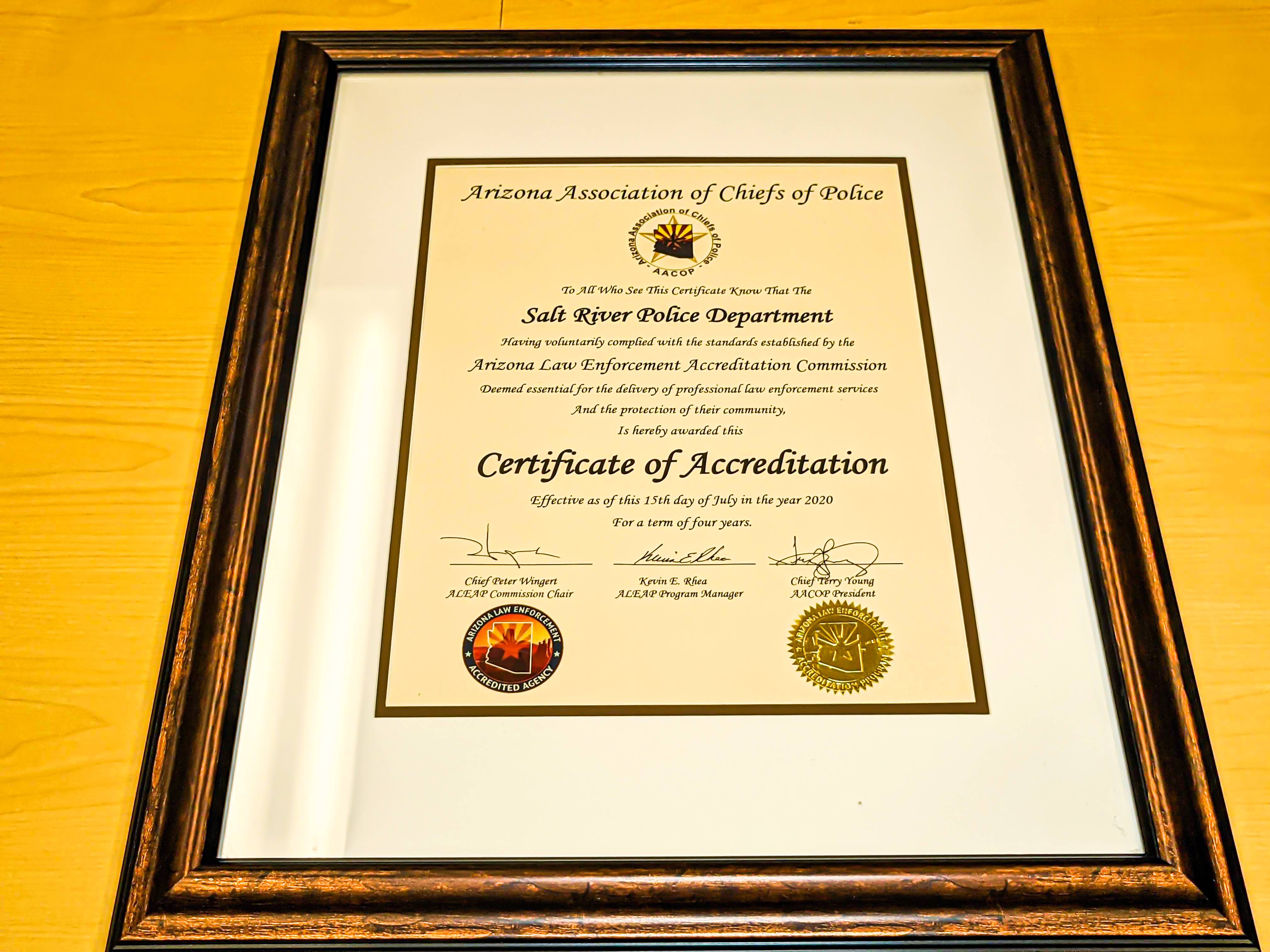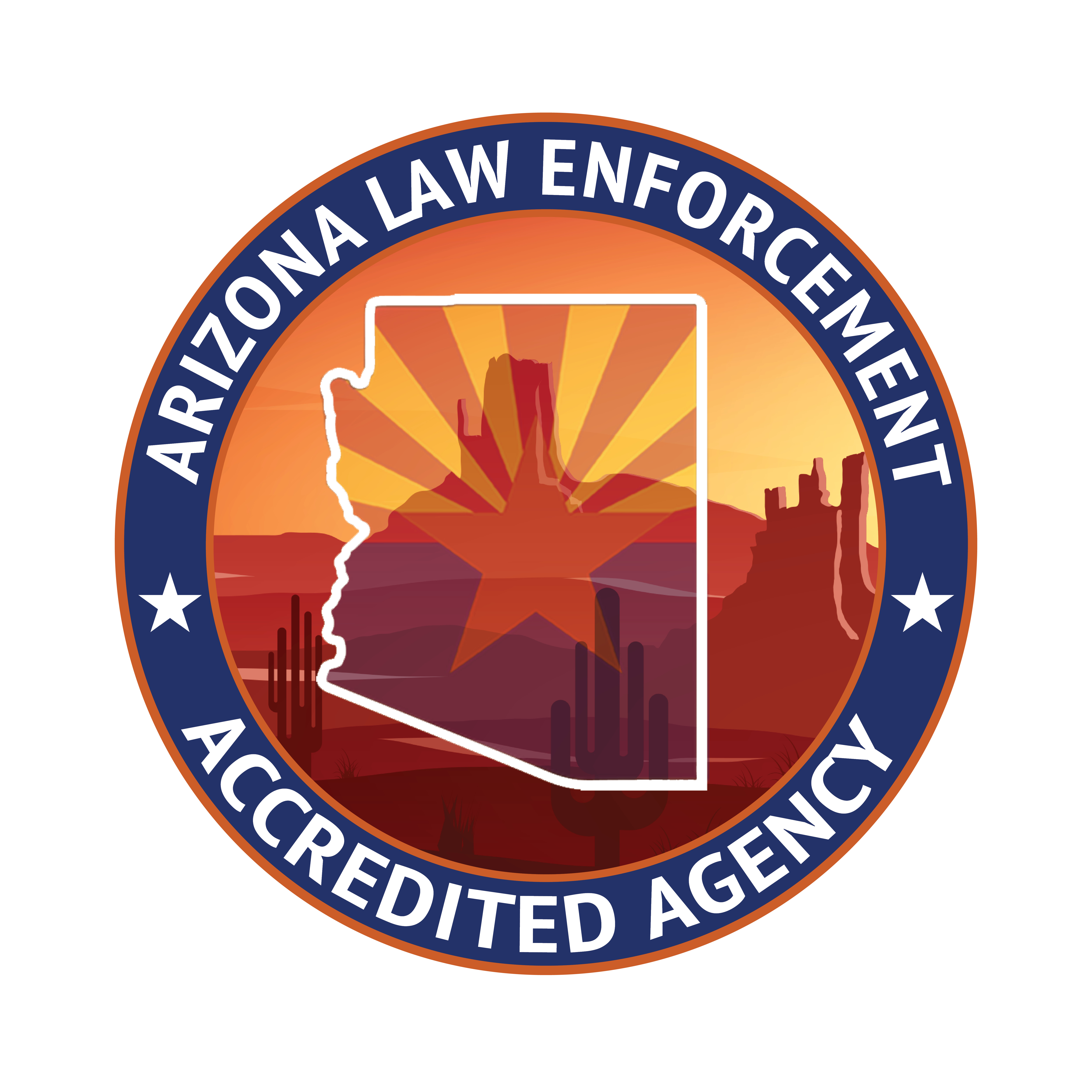Contact Us
To provide feedback on the Community Policing Dispatch, e-mail the editorial board at CPDispatch@usdoj.gov.
To obtain details on COPS Office programs, publications, and resources, contact the COPS Office Response Center at 800-421-6770 or AskCopsRC@usdoj.gov

U.S. Department of Justice
Office of Community Oriented Policing Services
Washington, DC 20530
In today’s policing environment, assuring the community that its law enforcement agency is adhering to best practices is critical to maintaining their trust and support. Of equal importance to tribal agencies is maintaining the high regard of neighboring law enforcement agencies with whom they can collaborate to enhance the safety and quality of both tribal and nontribal life in surrounding areas.
The surest way to accomplish both goals is by earning state or national accreditation, which demonstrates that a law enforcement agency meets widely recognized standards of professionalism based on objective, independent assessment and validation of its policies, procedures, and operations.
In seeking accreditation, agencies must adhere to practices and policies that are proven to provide efficient, effective, and fair policing and must maintain high operational standards for the duration of their accreditation.
Benefits tribe, agency, and surrounding community
 Accredited tribal agencies can not only provide better services to their communities, but also are highly respected by other law enforcement agencies. They enjoy greater cooperation than unaccredited agencies and smoother collaboration with their neighbors. They are also less liable to lawsuits and better prepared to respond to legal requirements or court orders.
Accredited tribal agencies can not only provide better services to their communities, but also are highly respected by other law enforcement agencies. They enjoy greater cooperation than unaccredited agencies and smoother collaboration with their neighbors. They are also less liable to lawsuits and better prepared to respond to legal requirements or court orders.
Four tribal law enforcement agencies that have discovered the benefits of accreditation are the Grand Ronde Tribal Police Department (GRTPD) in Grand Ronde, Oregon; the Oneida Indian Nation Police Department (OINPD) in Oneida, New York; the Salt River Pima-Maricopa Indian Community (SRPMIC) Police Department (SRPD) in Scottsdale, Arizona; and the Gun Lake Tribal (GLT) Public Safety Department in Shelbyville, Michigan.
 The leaders of these agencies are enthusiastic proponents of accreditation, as are Kevin Rhea, Director of the Arizona Law Enforcement Accreditation Program (ALEAP) Program of the Arizona Association of Chiefs of Police (AACOP), and Stacy Olson, Accreditation Manager for SRPD and the ALEAP Tribal Liaison.
The leaders of these agencies are enthusiastic proponents of accreditation, as are Kevin Rhea, Director of the Arizona Law Enforcement Accreditation Program (ALEAP) Program of the Arizona Association of Chiefs of Police (AACOP), and Stacy Olson, Accreditation Manager for SRPD and the ALEAP Tribal Liaison.
Reduces liability
A benefit all these leaders cited was the reduction of legal liability. The process of applying for and maintaining accreditation not only decreases the risk of lawsuits, but also prepares the agency to handle difficult situations. The administrative practices accreditation requires ensure that an agency has records, documentation, and policies enabling them to respond quickly to the community in times of crisis as well as in court.
The Gun Lake Tribe is in the process of earning certification by the Michigan Association of Chiefs of Police and the Michigan Sheriffs Association through the Michigan Law Enforcement Accreditation Commission. The tribe's public safety director, Dennis Wilkins, said, “It gives us more protection in civil litigation to say we have complied with independent standards and been reviewed and found compliant by an independent entity."
Added Jake McKnight, Chief of the GRTPD, which received accreditation through the Oregon Accreditation Alliance, “There is so much potential liability in police work. You need to do whatever you can to limit it. If you’re in front of a judge and the defense attorney is challenging your department, you want to be able to prove you are doing everything right.”
Increases respect and pride
“You also get more respect from municipal, state and county law enforcement. It shows the public that we want to do all we can to be the best possible police department. Our officers are proud of belonging to a certified agency and being able to tell other agencies we have accreditation,” McKnight said.
Wilkins agreed: “Accreditation codified our practices, which provides continuity and gives officers confidence when they’re working because the policies they are following aren’t open to interpretation from supervisor to supervisor.
“It is a great retention and recruiting tool, too. It lets people know we uphold high standards and that our training requirements exceed national standards. Our employees also like saying they work for an accredited agency.”
Supports collaborative efforts
Another benefit is the enhanced ability to collaborate. Said Ray Halbritter, Oneida Indian Nation Representative, whose agency was the first to earn national accreditation more than 25 years ago by the Commission on Accreditation for Law Enforcement Agencies (CALEA), “There was a tremendous amount of mutual respect and coordination prior to being cross-deputized by our surrounding counties, which was enhanced by our accreditation.
“When we cross-deputized, our accreditation meant we would be putting more highly trained boots on the ground to partner with local law enforcement. If an agency is accredited, there is a built-in trust factor when working with other agencies.”
OINPD Chief Gary Henderson agreed. “It’s an advantage for local law enforcement as well as tribal. With cross-deputization and county-wide authority, we’re a force multiplier, backing up sheriff’s deputies and state troopers whenever needed.”
According to ALEAP tribal liaison Olson, there’s much greater respect for accredited tribal agencies. “Speaking with tribal chiefs, I hear that they don’t want to be seen as lacking the skill set other public safety agencies have. Accreditation demonstrates that they have high standards.
"It’s a mark of pride not just for the agency, but for the tribal members. It makes a huge difference to the Elders, knowing their police are respected by others in the state.”
Said SRPD Chief Karl Auerbach, whose agency was the first tribal police department to become fully accredited in Arizona, as well as the first state-accredited department in Indian Country, “We believe that sharing information about the benefits of being fully accredited is very important because it would be of great value to other tribes and their law enforcement departments.
“The high level of industry standards and best practices required by accreditation improve the safety and welfare of the communities they serve, as well as the safety and wellness of their police officers and fire professionals.
“And we hope that someday those standards and practices will become the national model for all American police departments.”
Adaptable to tribal agencies
Two types of accreditation are available to tribal agencies: state and national. According to the International Association of Directors of Law Enforcement Standards and Training (IADLEST), approximately 36 states currently have a functioning state law enforcement accreditation program. In addition, there are two national organizations that offer accreditation, CALEA and the International Association of Campus Law Enforcement Administrators (IACLEA).
Both can be adapted to tribal agencies. Said OINPD Chief Gary Henderson, “Based upon our size and because we don’t operate a jail, there were fewer CALEA standards for us than for others. They vary according to the number of personnel as well as the agency’s functional responsibilities.”
Asked about requirements for accreditation, GRTPD’s Chief McKnight said his agency didn’t have a lot of changes to make, but that those they did make, especially in the administrative area, were useful. “We made some changes in staffing because we only had one person in evidence and made one sergeant’s position more administrative. We made some software acquisitions, too, but got a discount for the purchase through the Oregon Accreditation Alliance.”
GLT's Director Wilkins agreed that accreditation didn’t require a lot of adjustments. “Not much changed in the way we operate. We updated some policies and procedures and added some new ones regarding officer safety and wellness,” he said.
“However, some tribes may be concerned. They fought hard for sovereignty, and don’t want to be told what they can and can’t do by anybody other than the Bureau of Indian Affairs,” he added. “But we are not giving up any sovereignty, we’re just seeking for tribal law enforcement what any city police department would, which is to empower our officers to enforce the law in the best possible way.”
Olson, the ALEAP tribal liaison, agreed. “ALEAP isn’t telling tribes how to run their police departments. They must meet high standards for inventory control, for instance—but, how they do that is their business. We don’t dictate what it must be. Accreditation doesn’t change tribal autonomy, and their jurisdiction is not encroached upon.”
Support and funding
Though accreditation requires time and funding, the cost is less than the potential outcome of a legal matter and may lower liability insurance costs as well.
Chief McKnight said, “Don’t worry about the process—it’s not as difficult as some make it sound. Hire a consultant in the beginning to explain what needs to be done. We also reached out to AccredNet, a federation of state law enforcement accreditation entities, which provides guidance and support. They walked us through things online or by phone.”
Rhea, Director of ALEAP and Treasurer of AccredNet, added, “You’re not left alone on an island, there are people willing to help you. Also, COPS Office funding covers all the assessment fees.”
Funding for accreditation efforts, including fees, overtime, and software, among other costs, is available through the U.S. Department of Justice (DOJ) Office of Community Policing Services (COPS Office), which supports agency accreditation through the Supporting Law Enforcement Agencies in Seeking Accreditation Solicitation program.
Faye C. Elkins
Sr. Technical Writer
COPS Office
Subscribe to Email Updates
To sign up for monthly updates or to access your subscriber preferences, please enter your email address in the Subscribe box.






